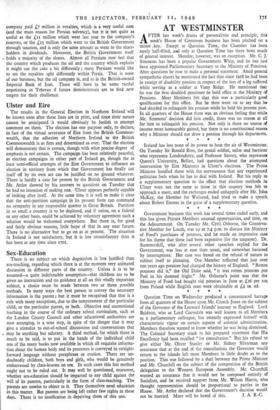AT WESTMINSTER
AFTER last week's drama of personalities and principle, this week's House of Commons business has been pitched on a minor ,key. Except at Question Time, the Chamber has been rarely half-filled, and only at Question Time has there been much of general interest. Monday, however, was an exception. Mr. C. J. Simmons has been a popular Government Whip, and he has just been appointed Parliamentary Secretary to the Ministry of Pensions. After questions he rose to make a personal statement. Amid general sympathetic cheers he mentioned the fact that since 1918 he had been in receipt of disability pension in respect of the loss of a leg suffered while serving as a soldier at Virny Ridge. He mentioned that he was the first disabled pensioner to hold office at the Ministry of Pensions. Most Members felt that this was a particularly good qualification for this office. But he then went on to say that he had decided to relinquish his pension while he held his present post. In all quarters of the House there was an obvious feeling that while Mr. Simmons' decision did him credit, there was no reason at all for him to relinquish his pension. Not only is there no source of income more honourably gained, but there is no constitutional reason why a Minister should not draw a pension through his department.,
* * * Ireland has lost none of its power to heat the air of Westminster. On Tuesday Sir Ronald Ross, the genial soldier, sailor and barrister who represents Londonderry, and Professor Savory, who represents Queen's University, Belfast, had questions about the attempted intervention by Eire Ministers in Ulster's elections. The Prima Minister handled these with the nervousness that any experienced politician feels when he has to deal with Ireland. But his reply to a supplementary question to the effect that election methods in Ulster were not the same as thine in this country was felt to approach a sneer, and the exchanges ended unhappily after Mr. John McKay, the Member for Wallsend, had tried to make a speech about Robert Emmet in the guise of a supplementary question.
* * *
Government business this week has several times ended early, and this has given Private Members unusual opportunities, and time, on the Adjournment. On Tuesday Mr. Cyril Osborne, the Conserva- tive Member for Louth, was up at 7.4 p.m. to discuss the Ministry of Food's purchases of potatoes, and he made an impressive case for his theme that these had been expensive (for the taxpayer). Dr. Summerskill, who after several other speeches replied for the Government, was less at ease than usual, and somewhat harassed by interruptions. Her case was based on the refusal of nature to subject itself to planning. One Member reflected that just over too years ago potatoes had changed the history of England. "Rotten potatoes did it," the Old Duke said, "it was rotten potatoes put Peel in his damned fright." Mr. Osbome's point was that the Ministry of Food had bought old potatoes in June at £26 per ton from Poland while English ones were obtainable at £4 03. od.
* * * Question Time on Wednesday produced a concentrated barrage from all quarters of the House upon Mr. Creech Jones on the subject of the Governor of the Leeward Islands' journey to England. Lord Baldwin, who as Lord Corvedale was well known to all Members as a parliamentary colleague, has recently expressed himself with characteristic vigour on certain aspects of colonial administration. Members therefore wanted to know whether he was being dismissed. The Colonial Secretary stuck to his prepared statement that His Excellency had been recalled "for consultation." But his refusal to give either Mr. Oliver Stanley or Mr. Sidney Silverman any assurance that at the end of the consultations the Governor would return to the islands left most Members in little doubt as to the position. This was followed by a duel between the Prime Minister and Mr. Churchill on the subject of the composition of the British delegation to the Western European Assembly. Mr. Churchill wanted an assurance that it would not be composed entirely of Socialists, and he received support from Mr. Wilson Harris, who thought representation should be proportional to parties in the House. Mr. Attlee declared that the Government's decision would not be hurried. More will be heard of this. J. A. B.-C.






































 Previous page
Previous page